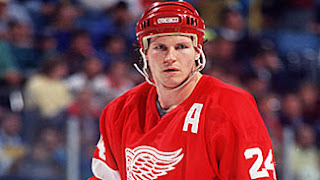Unlike most athletes
discussed on this blog, Bob Probert was not one that relied on skill or finesse
during his hockey career. Probert was an enforcer; and he did a good job of
doing it, winning most of his 246 fights on the ice. After 16 seasons in the
NHL with Detroit and Chicago, his 3,300 penalty minutes make him fifth on the
league’s career list. Similar to other NHL enforcers, Probert suffered from
alcohol and cocaine addictions during his career. Probert died of heart failure
at the age of 45.
 After examining Probert’s
brain tissue, researchers at Boston University said that he suffered from degenerative
brain disease - Chronic Traumatic Encephalopathy (CTE). This disease was also
present in more than 20 deceased professional football players, which led to
the NFL changing rules and policies in an effort to limit head injuries.
After examining Probert’s
brain tissue, researchers at Boston University said that he suffered from degenerative
brain disease - Chronic Traumatic Encephalopathy (CTE). This disease was also
present in more than 20 deceased professional football players, which led to
the NFL changing rules and policies in an effort to limit head injuries.
Although the NHL is
trying to reduce hits to the head in hockey, they are still allowing players to
fight. This puts enforcers in a dangerous position, due to possible brain
diseases caused by fighting. The NHL will eventually have to ban fighting, if
more enforcers continue to suffer from depression, brain diseases and alcohol
and substance dependencies. The death of Probert has raised concussion
awareness in the sport, and will continue to be monitored in order to ensure
the safety of players.


